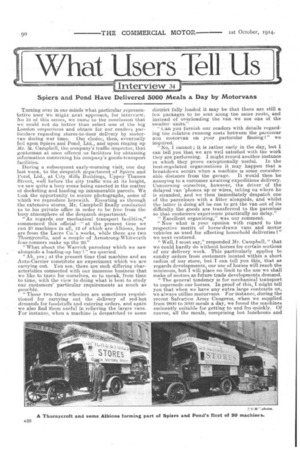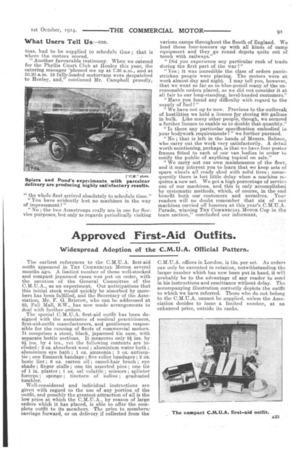What Users Tell Us
Page 16

Page 17

If you've noticed an error in this article please click here to report it so we can fix it.
Spiers and Pond Have Delivered 3000 Meals a Day by Motorvans
Turning over in our minds what particular representative user we might next approach, for interview, No 34 of this series, we came to the conclusion that we could not do better than select one of the big London emporiums and obtain for our readers particulars regarding stores-to-door delivery by motorvan during war time. Our choice, then, eventually fell upon Spiers and Pond, Ltd., and upon ringing up Mr. Ai. Campbell, the company's traffic inspector, that gentleman at once offered us facilities for obtaining information concerning his company's goods-transport During a subsequent early-morning visit, one day last week, to the despatch department of Spiers and Pond, Ltd., at City ALIN Buildings, Upper Thames Street, well before the city traffic was at its height, we saw quite a busy scene being enacted in the matter of docketing and loading up innumerable parcels. We took the opportunity to secure photographs, some of which we reproduce herewith. Escorting us through the extensive stores, Mr. Campbell finally conducted us to his private office in order to be free from the busy atmosphere of the despatch department. "As regards our mechanical transport facilities," commenced this official—" at the present time we run 20 machines in all, 12 of which are Albions, four are from the Lacre Co.'s works, while there are two Thornycrofts, and a couple of Armstrong-Whitworth four-tonners make up the 20."
"What about the Warrick parcelcar which we saw alongside a loading-up hay?" we queried. " Ah, yes ; at the present time that machine and an Auto-Carrier constitute an experiment which we are carrying out. You see, there are such differing characteristics connected with our immense business that. we like to taste for ourselves, so to speak, from time to time, with the view to doing what is best to study our customers' particular requirements as much as possible.
"Those two three-wheelers are sometimes requisitioned for carrying out the delivery of red-hot demands for foodstuffs and catering orders, and again we also find them useful in relieving the larger vans. For instance, when a machine is despatched to some
district fully loaded it may be that there are still a few packages to be sent along the same route, and instead of overloading the van. we use one of the smaller units."
Can you furnish our readers with details regarding the relative running costs between the parcelcar and motorvan on your particular finding " we inquired. "No, I cannot ; it is rather early in the day, but I can tell you that we are well satisfied with the work they are performing. I might record another instance in which they prove exceptionally useful. In the best-regulated organizations it may happen that a breakdown occurs when a machine is some considerable distance from the garage. It would then be annoying to a customer awaiting expeditious delivery. Concerning ourselves, however, the driver of the delayed van 'phones up or wires, telling us where he is stranded, and we then immediately despatch one of the parcelcars with a fitter alongside, and whilst the latter is doing all he can to get the van out of its difficulty the goods are transferred to the parcelcar so that customers experience practically no delay."
"Excellent organizing," was our comment.
"Now what is your opinion with regard to the respective merits of horse-drawn vans and motor vehicles as used for effecting household deliveries ?" we next ventured.
"Well, I must say," responded Mr. Campbell, "that we could hardly do without horses for certain sections of our delivery work. This particularly applies to sundry orders from customers located within a short radius of our store, but I can tell you this, that as regards developments, our use of horses will reach the minimum, but I will place no limit to the use we shall make of motors as future trade developments demand.
"The general tendency is for mechanical transport to supersede our horses. In proof of this, I might tell you that when we have any extra large contracts on, we always utilize rnotorvans. For instance, during the recent Salvation Army Congress, when we supplied from 2800 to 3000 meals a day, we found the machines eminently suitable for getting to and fro quickly. Of course, all the meals, comprising hot luncheons and teas, had to be supplied to schedule time ; that is where the motors scored.
" Another favourable testimony. When we catered for the Phyllis Court Club at Henley this year, the catering manager 'phoned me up at 7.30 a,m., and at 10.30 a.m. 15 fully-loaded motorvans were despatched to Henley, and," continued Mr. Campbell proudly, "the whole fleet arrived absolutely to schedule time." "You have evidently lest no machines in the way of impressment ? "
" No; the two Armstrongs really are in use for Ser vice purposes, but only as regards periodically visiting various camps throughout the South of England. We load these four-tonners up with all kinds of camp equipment and they go round depots quite out of touch with railways."
"Did you experience any particular rush of trade during the first part of the war ? "
" Yes; it was incredible the class of orders panicstricken people were placing. The motors were at
work almost day and night. I may tell you, however, that we went so far as to -blue-pencil many of the unreasonable orders placed, as we did not consider it at
all fair to our long-standing, level-headed customers." "Have you found any difficulty with regard to the supply of fuel? "
"We have not up to now. Previous to the outbreak of hostilities we held a licence for storing 600 gallons
in bulk. Like many other people, though, we secured a further licence to enable us to double that quantity..." "Is there any particular specification embodied in your bodywork requirements " we further pursued.
" No ; that is left in the hands of Messrs. Robson, who carry out the work very satisfactorily. A detail
worth mentioning, perhaps, is that we have four poster frames fitted to each of our van bodies in order to notify the public of anything topical on sale."
"We carry out our own maintenance of the fleet, and it may interest you to learn that we keep sets of spare wheels all ready shod with solid tires ; conse
quently there is but little delay when a machine requires a new set. We get a high percentage of servico out of our machines, and this is only accomplished by systematic methods, which, of course, in the end benefit both our customers and ourselves. Your readers will no doubt remember that six of our machines carried off honours at this year's C.M.U.A. Parade, winning THE COMMERCIAL Moron Cup in the team section," concluded our informant.




















